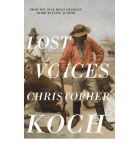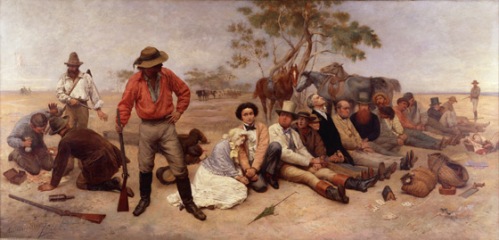
 Christopher Koch is brilliant at exploring charismatic personalities. This is territory that he has covered in a number of his books, including The Memory Room which I reviewed on this blog back in 2009. In that book, even though the character Vincent is a nerd, he is able to attract friends, and more importantly, loyalty. Here in Lost Voices Koch shows us the lure of the charismatic leader, and the effect he has on men in search of a mentor. It’s superbly well done.
Christopher Koch is brilliant at exploring charismatic personalities. This is territory that he has covered in a number of his books, including The Memory Room which I reviewed on this blog back in 2009. In that book, even though the character Vincent is a nerd, he is able to attract friends, and more importantly, loyalty. Here in Lost Voices Koch shows us the lure of the charismatic leader, and the effect he has on men in search of a mentor. It’s superbly well done.
The choice of narrative perspective enables the reader to see the effect close up. In Parts 1 and 3, the narrator is Hugh Dixon looking back on his youth from old age. He shares his memories of people both as he viewed them in the past and also from a more mature vantage point. He recognises what impressed him then, and what faults and idiosyncracies he was able to identify both then and now. His is a generous perspective: he tends to think well of people and in most circumstances, to be forgiving.
Hugh’s father Jim Dixon is one of many self-made men in this novel: during the Depression his brother George was favoured with a university education which led to a career in the legal profession, but Jim – brought up with expectations of joining Hobart’s ruling class – had to leave school at sixteen. He sustains his resentment long afterwards: when he has through hard work and study succeeded in qualifying as an accountant and is offered a job in the family business, he repudiates it. He has too much pride to associate with those who treated him unfairly. But when he lands in trouble because of the influence of a charismatic punter and urgently needs £100 to avoid ruin, he is too ashamed to ask for help from the only one who could offer it. It is Hugh who has the courage to ask, and he goes on to forge a long-term relationship with his great-uncle Walter as a powerful mentor. Pride and shame are key motifs in Lost Voices.
As in Annah Faulkner’s The Beloved (see my review) there is parent-child conflict about a child’s future, but the wider narrative perspective in Lost Voices enables the author to explore the issue in a more sophisticated way. Hugh is a bit of a disappointment to his father: Jim was a keen sportsman, limited only by recurrent bronchitis which prevented his enlistment in the war. His ambition is for Hugh to matriculate and enter the professions. But Hugh is no good at sport and indifferent at school, unlikely to become a lawyer the way his father wants him to be. Hugh wants to be a commercial artist, doing illustrations for books. (Remember those lovely B&W line illustrations that used to grace books that were published in the 1950s?) Hugh is eleven when he realises that his father loves him and wants to be proud of him yet at the same time bitterly resents his son repudiating the choices that he never had as a boy.
Jim Dixon is not the only character who stumbles onto the wrong side of the law. In Part 2 the narrative shifts to 1854 and the story of Hugh’s great-grandfather Martin Dixon, who comes under the spell of the charismatic bushranger, Lucas Wilson. When the family is bailed up in their own dining-room, Martin is sent to show the escaped convict Liam Dalton the gun-room. The pattern of adverse father-son relationships here propels Martin into an extraordinary impulse: he takes the opportunity to ride off with Dalton, risking his life to get a journalistic scoop, in part because he doesn’t get on with his father…
Anyone who’s ever been to Tasmania can’t help but contrast the exquisite beauty of the island with the sense of menace that derives from its convict past, the dispossession of the Aborigines, a shocking massacre in recent times and its often hostile weather and environment. Koch’s story portrays the bushrangers’ hideout as a kind of Eden masquerading as a Utopia. Martin is beguiled by the peace and solitude of the Nowhere Valley, where he is required to work as a farm labourer until taken up by Lucas Wilson and groomed as a disciple. Martin’s reservations about autocratic rule and the tedium of farm work are deflected with poetry, philosophy and discourse about the stars, but there comes a time when evil brought into the valley erupts into violence, and eventually Martin has to face up to the realities about how his mentor provides for his flock, beyond what can be produced on the farm.
The female characters are interesting. Patterns repeat themselves when young men fall for women older and wiser than themselves. In the 19th century narrative Martin Dixon falls for Wilson’s mistress Frances, and then a century later Hugh is besotted by Moira Doran, Uncle Walter’s housekeeper. Both these women are fond of their men, but seem immune to their charisma. It is as if they play the role of protecting the young man from being wholly captivated by the older man’s enthusiasms.
There are two truly evil characters in Lost Voices: the utterly charmless Griffin who tags along to Nowhere Valley when Dalton makes his escape from Port Arthur, and the sinister Max Fell who becomes a mentor to Hugh’s boyhood friend and lands him in great peril. The wicked deeds of these men propel the separate yet complementary story lines so that they never falter. Part 2 climaxes with a tense shootout, and the suspense and menace in Part 3 kept me reading well into the night.
The writing is superb, as you can see from the Sensational Snippet I posted a few days ago. Koch is especially good at rendering the sense of being marooned in time and space in 1950s Tasmania, a place that is safe for children to roam but intellectually claustrophobic, socially restrictive and fundamentally hypocritical. The cartoons and advertisements that Max Fell designs are limited in scope both by censorship and by the tastes of the times, but these restrictions don’t inhibit his private behaviour and it doesn’t take much to lift the lid on the underbelly of respectable Hobart. Again, however, Koch is too sophisticated an author to present a one-sided view of this: the scene where young Wall discovers Fell’s secret stash and is completely repelled by it isn’t just innocence, it’s also emblematic of a staunch moral code that stands him in good stead later.
Andrew Reimer at the SMH found much to admire, Geordie Williamson in The Australian thought that Lost Voices felt like the first proper novel he’d read in ages – and I am still baffled by the omission of this stunning book from the current 2013 Miles Franklin longlist. My advice is to beg, borrow or steal a copy as soon as you can.
Author:Christopher Koch
Title: Lost Voices
Publisher: Fourth Estate (Harper Collins) 2012
ISBN: 9780732294632
Source: Personal copy, purchased from Readings, $32.99
PS I can’t resist re-posting the magnificent painting which is revealed when the book cover is unfolded. It was painted by William Strutt in 1877, depicting a daring 1852 robbery on what is now Melbourne’s St Kilda Rd leading to the south-eastern suburbs.
Availability
Fishpond: Lost Voices



I love that picture so evoking lisa ,all the best stu
LikeLike
By: winstonsdad on April 16, 2013
at 2:57 am
[…] in the novels of the late, great Christopher Koch whose novels Out of Ireland (1991) and Lost Voices (2012) are for me, quintessentially […]
LikeLike
By: Authors from Tasmania (Australian Authors #2) | ANZ LitLovers LitBlog on December 6, 2017
at 10:21 pm